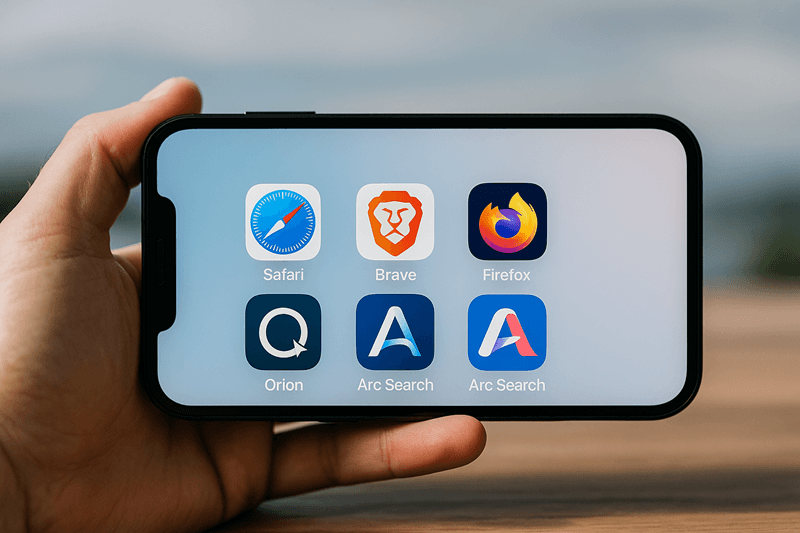Is your browser eating too much RAM?
We tested them all in 2026. →See the full results here
After our complete benchmark of the most powerful Android browsers, it’s time to move to the iOS ecosystem. On the surface, things seem simpler here — all browsers use the same rendering engine, WebKit, imposed by Apple.
But that’s only how it seems.
Because, with the introduction of the new European regulations (DMA – Digital Markets Act), Apple has been forced — starting with iOS 17.4 — to allow the use of alternative browser engines within the European Union.
This means that, in theory, browsers like Chrome or Firefox can run their own engines (Blink and Gecko, respectively), but only in EU versions — and even then, with numerous technical and procedural limitations.
In practice, we’ll see throughout the tests below where and if any iOS browser actually uses an alternative engine.
Testing Methodology
The tests were conducted on an iPhone 15 Pro Max running the latest version of iOS 18, under controlled conditions:
- Stable Wi-Fi connection
- 3 benchmark runs for each browser (average results shown in tables)
- Device reset to factory settings before testing
- No apps installed except the test browsers and the default system apps
- No background apps running
The evaluation followed the same criteria as in the Android browser test:
- Speedometer 3.1 – JavaScript & real-world UX performance
- Adblock Tester (adblock-tester.com) – ad and tracker blocking efficiency
- Cover Your Tracks (EFF) – anti-tracking, cookie, and fingerprint protection tests
Additionally, we examined several other factors:
- Sync and password management features
- Extension support
- Stability
- Overall user experience
Evaluation Criteria
- Performance Score in Speedometer 3.1
- Adblock Efficiency Score out of 100 (Adblock Tester)
- Privacy Protection Cover Your Tracks results (trackers, cookies, fingerprint)
- Features Password manager, sync, save pages, dark mode
- Extensions Real or limited support
- Rendering Engine WebKit or own engine (Blink / Gecko), where applicable
Browsers Performance
| Rank | Browser | Speedometer 3.1 Score |
|---|---|---|
| 1 | Safari | 33.3 |
| 2 | Opera | 31.8 |
| 3 | Firefox | 30.2 |
| 4 | Arc Search | 29.2 |
| 5 | Orion | 28.6 |
| 6 | Edge | 27.4 |
| 7 | Chrome | 26.6 |
| 8 | DuckDuckGo | 26.1 |
| 9 | Brave | 25.1 |
| 10 | Vivaldi | 21.5 |
Browsers Adblock and Tracking
| Rank | Browser | Adblock Efficiency | Tracking Protection |
|---|---|---|---|
| 1 | Brave | 100/100 | Yes |
| 2 | Arc Search | 100/100 | Yes |
| 3 | Orion | 100/100 | Partial |
| 4 | Vivaldi | 92/100 | Partial |
| 5 | Opera | 77/100 | Partial |
Browsers Complete Results
| Browser | Speedometer 3.1 | Adblocker | Adblock Efficiency | Password Manager | Sync | Extensions | Page Save | Dark Mode | Blocking Tracking Ads | Blocking Invisible Trackers | Fingerprint Protection | Main Observations |
|---|---|---|---|---|---|---|---|---|---|---|---|---|
| Safari | 33.3 | 38/100 | Average | iCloud Keychain | Yes | Safari Extensions | Yes | Yes | Partial | Partial | Unique | Highest performance, perfectly integrated with iOS |
| Opera | 31.8 | 77/100 | Good | Yes | Yes | No | Yes | Yes | Partial | Partial | Unique | Good balance between performance and features |
| Firefox | 30.2 | 38/100 | Average | Yes | Yes | Limited | Yes | Yes | Partial | Partial | Unique | Fast but modest anti-tracking protection |
| Arc Search | 29.2 | 100/100 | Complete | Yes | Yes | No | Yes | Yes | Yes | Yes | Unique | Excellent blocking, modern interface with AI integration |
| Orion | 28.6 | 100/100 | Complete | iCloud | Yes | Yes (Safari/Chrome) | Yes | Yes | Partial | Partial | Unique | Open-source, real desktop extensions |
| Edge | 27.4 | 33/100 | Average | Microsoft | Yes | No | Yes | Yes | Partial | Partial | Unique | High performance but weak protection |
| Chrome | 26.6 | 38/100 | Average | Google Passwords | Yes | No | Yes | Yes | Partial | Partial | Unique | Good Google integration, no real adblock |
| DuckDuckGo | 26.1 | 61/100 | Good | Yes | Yes | No | Yes | Yes | Yes | Yes | Unique | Decent privacy, minimalist interface |
| Brave | 25.1 | 100/100 | Complete | Yes | Yes | No | Yes | Yes | Yes | Yes | Unique | Total ad and tracker blocking |
| Vivaldi | 21.5 | 92/100 | Very Good | Yes | Yes | No | Yes | Yes | Partial | Partial | Unique | Complex interface, slower on iOS |
About Rendering Engines on iOS
A crucial aspect when discussing browsers on iPhone is the fact that all of them, without exception, use the same rendering engine: WebKit, developed by Apple.
Over the years, this has been a strict limitation — no matter what browser you used, under the hood it was always WebKit rendering your pages.
Things began to shift with the Digital Markets Act (DMA), the EU legislation that forces Apple to allow, at least theoretically, alternative engines like Blink (Chrome) or Gecko (Firefox).
In practice, however, the certification process and restrictions imposed by Apple are so complex that no publicly available browser on the App Store has made the switch.
To verify this, we explicitly tested Chrome and Firefox, the most likely candidates to have implemented their own engines.
User-agent and JavaScript API analysis (via browserleaks.com and pixelscan.net) clearly show the presence of the AppleWebKit/… string, confirming that all browsers still run on the same Safari engine.
Alternative engines may exist in internal builds, but there are no distributed versions on the App Store yet.
In other words, the performance differences observed between browsers don’t come from the internal engine, but from interface optimization, memory management, caching, and additional features.
And that makes it very hard to beat Safari on its own playground.
Conclusions: The Best iOS Browser by Category
Privacy and Ad Blocking
- Brave – Complete protection; blocks all ads and trackers.
- Arc Search – Surprisingly effective, with a clean interface and built-in AI.
- Orion – Open-source, real extension support, and solid default privacy.
Speed
- Safari – Performance champion, natively optimized for iOS.
- Opera – Very balanced between speed and functionality.
- Firefox – Solid performance, though with modest privacy protection.
For Advanced Users
- Orion – Supports both Safari and Chrome extensions; clean, lightweight interface.
- Vivaldi – Ideal for users who prefer a desktop-style layout.
Cross-Platform Integration
- Chrome – Perfect for the Google ecosystem.
- Edge – Best for Microsoft / Windows users.
- Safari – Naturally suited for those fully in the Apple ecosystem.
Final Verdict
On iOS in 2025, Safari remains the benchmark for speed and stability, though it admittedly benefits from an unfair advantage within Apple’s closed ecosystem.
Brave dominates in privacy, while Orion and Arc Search bring the most modern and refreshing approaches — both proving to be pleasant surprises in our tests.
In the case of Brave, it’s worth highlighting a particularly useful and rare feature on iOS: the ability to play YouTube videos in the background without needing a YouTube Premium account.
Even more impressively, this feature is also available in Apple CarPlay, allowing users to create playlists directly within the browser and play music or podcasts from YouTube through the car’s infotainment system — an elegant solution for those who don’t want to pay for the Premium subscription but still want continuous audio playback.
However, all of them still run on the same WebKit foundation — the true difference lies in each browser’s philosophy and optimization.
Behind Orion stands the same team that built the paid search engine Kagi, which we explored in depth in one of our article.
As for Arc Browser, we had already tested its desktop version in our 2025 desktop browser comparison, where it was excluded due to the mandatory account login.
On iOS, however, The Browser Company seems to have learned its lesson: the mobile app Arc Search no longer requires authentication and is freely usable straight from the App Store — a smart move that truly deserves recognition

